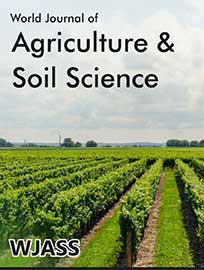 Research Article
Research Article
Responses of Solanum Lycopersicum to Organic Fertilizers Application
Afolayan Ezekiel Taiwo* and Akintunde Oluwabukola Oluwadamilola
Biology Department, Federal College of Education, Abeokuta Ogun State, Nigeria
Afolayan Ezekiel Taiwo, Biology Department, Federal College of Education, Abeokuta Ogun State, Nigeria.
Received Date: August 18, 2020; Published Date: September 03, 2020
Abstract
This study compares the effects of organic manure (Plants and animals) on the performance of Solanum lycopersicum L. The work was conducted at the Botanical nursery, behind the Botanical Garden, Federal College of Education, Abeokuta, Ogun State, Nigeria. The study adopted Complete Randomized Block Design (CRBD) in 3 replicates. The treatments were animal manure of cow dung, poultry dung, rabbit dung and Plant manure of Gliricidia sepium. The plants characters measured include the leaf length, stem height, number of branches, number of leaves, number of flowers and fruits. Data obtained were analyzed using the Analysis of Variance (ANOVA) while means were separated with Duncan Multiple Range Test (DMRT). Results obtained showed that growth characters (number of leaves, number of branches, stem height and leaf length) and yield characters (number of flowers and fruits in Tomato) were influenced by the plant manure of Gliricidia sepium and animal manures of rabbit droppings. From the results, it was observed that Gliricidia sepium and rabbit dropping were the best manures for the cultivation of tomato.
Keywords: Solanun lycopersicum; Gliricidia sepium; Organic manure; Yield
-
Afolayan Ezekiel Taiwo, Akintunde Oluwabukola Oluwadamilola. Responses of Solanum Lycopersicum to Organic Fertilizers Application. World J Agri & Soil Sci. 5(5): 2020. WJASS.MS.ID.000623.
-

This work is licensed under a Creative Commons Attribution-NonCommercial 4.0 International License.






